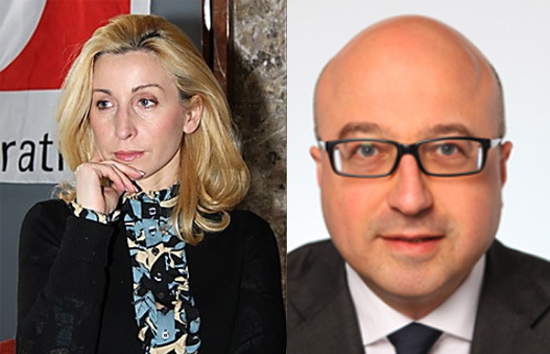That underlying yesterday’s government reshuffle is a desire to better succor the visions of the Catholic component of the majority? The Ministry of Culture has in fact become one and three: as of yesterday we can therefore boast of having as many as three undersecretaries for culture. The very evanescent figure of Ilaria Borletti Buitoni, about whose usefulness everyone harbors strong doubts, was not enough for us: Premier Matteo Renzi has therefore well thought of flanking her with Antimo Cesaro and Dorina Bianchi, freshly appointed and in these hours in Rome for the official investiture. The wealthy lady with a degree in political science is now joined by a jurist and a doctor, who, added to the minister,civil lawyer Dario Franceschini, make up a luxurious quatern of politicians whose relationship with culture should be carefully and thoroughly investigated.
 |
| Dorina Bianchi (photo by Vincenzo Iaconianni) and Antimo Cesaro (photo data.camera.it) |
Dorina Bianchi is known to most for being, as Luca Sappino called her in an article published inL’Espresso, a “super Catholic with the vice of changing parties.” In fact, Dr. Bianchi has covered a good part of the constitutional arc, changing her jersey seven times in the space of fifteen years: CCD, UDC, Margherita, PD, UDC again, PDL, to finally arrive at Angelino Alfano’s Nuovo Centrodestra. As Marco Palombi noted in Il Fatto Quotidiano, perhaps Dorina Bianchi “politically hasn’t found herself yet,” but on the other hand she has the certainty, as reported in a significant interview with Chi in 2008, that she prefers thongs to briefs, always thinks positive and uses a good body cream twice a day.
The newly appointed undersecretary’s political ideas find vent in a personal blog: and since Renzi appointed Dorina Bianchi as undersecretary for Cultural Heritage, we thought we would find some vague reference to the topic among the posts on his web space. Results? None. To mention only one sentence from Oscar Farinetti (we’re doing well), who wrote the preface to Dorina Bianchi’s book L’altra faccia della medaglia. The Mezzogiorno that makes it, lavishing in pearls like this one: “I want to live in Italy, feel Italian, bring lItaly to the world, enjoy the extraordinary good fortune of being born in the most biodiverse country, with the best views in the world, with the greatest artistic heritage in the world.” So if the only pseudo-cultural quote found in Dorina Bianchi’s blog is a sentence in which Farinetti praises Italy as the holder of the “greatest artistic heritage in the world,” one necessarily finds it hard to fault those who think that undersecretaries are superfluous figures for us, but essential for palace games (not that we had different feelings with Ilaria Borletti Buitoni and especially Francesca Barracciu, but one always hopes for better). On the other hand, Dorina Bianchi’s very stringent blog articles (they rarely exceed ten lines), provide us with a good sampling of political rhetoric: “Less taxes, more South, more family, more security, more health care. These are not slogans but the cornerstones of the Stability Law,” or “Our country is slowly coming out of the crisis thanks to the reforms approved by the #Government” (yes, there is the hashtag inside a blog article), and again “With this Stability Law the Government and Area Popolare have shown that they are in the forefront for the revival of the South.” In short: lots of prosopopeia, very little substance.
The other new undersecretary, Antimo Cesaro, who has a degree in Law and a specialization in Philosophy of Law, and is on Scelta Civica, is probably more familiar with culture: we learn from his page on Wikipedia (the source from which the encyclopedia draws turns out to be unreachable at the time this article is being written) that from 1998 to 2002 he was a member of the National Council of Cultural Heritage. And he, too, has a blog where he externalizes his opinions about the world around us: in addition, he also reports the texts of his speeches in Parliament. To the case of opinions about the world, however, belongs his latest intervention on culture, dating back to July 26. In the post, titled Pompeian Red or cave custodem, Cesaro lamented the fact that Dario Franceschini had not yet outlined the “Karate move with which to deal with union corporatism, the real stumbling block to any pious intention of enhancing the value of our cultural heritage.”
This was followed by a less-than-noble and inelegant generalization about “unionized Italic custodians,” described by the refined Cesaro as the category comprising “those who -- in addition to playing cards in a museum courtyard or sunbathing on one of its bright terraces -- are the professionals of the sudden strike, weekend agitation and Sunday union assembly.” And if these screeches were not enough, Cesaro did not fail to apostrophize the behavior of those in Pompeii, in July last year, who had called a regular union assembly (which we had also covered in an article that received nearly two hundred comments), as “unspeakable” and deserving of disciplinary measures and sanctions.
It must be said that Renzi could not have found figures who better embodied the ministry’s actions in recent times: on the one hand rhetoric applied to poverty of content, on the other hand the continuous mortification of workers’ grievances and deafness to their demands. Of course: it will be said that that of the undersecretary has always been a political figure, useful more for assigning chairs needed to maintain the balance of majorities, than for imparting acceleration to the actions of the government, and thus for being of use to the Italians. On the contrary: in the words of Tomaso Montanari, who spoke just today on the subject, we are facing a new case of “multiplication of useless, clientelistic, harmful sub-government posts.” After all, this reshuffle, with the distribution of 8 new seats, four of which are reserved for members of the Ncd (whose number of ministers and undersecretaries is probably already higher than that of its constituents), raises the suspicion that it was designed as an attempt to convince the Alphanians to turn their noses up at the Cirinnà bill. And thus to prevent the Renzi government from running the risk of suffering devastating blows. Nothing new, in short: culture will continue to be managed as before. Those who read will judge whether the news can be considered positive.

The author of this article: Federico Giannini
Nato a Massa nel 1986, si è laureato nel 2010 in Informatica Umanistica all’Università di Pisa. Nel 2009 ha iniziato a lavorare nel settore della comunicazione su web, con particolare riferimento alla comunicazione per i beni culturali. Nel 2017 ha fondato con Ilaria Baratta la rivista Finestre sull’Arte. Dalla fondazione è direttore responsabile della rivista. Nel 2025 ha scritto il libro Vero, Falso, Fake. Credenze, errori e falsità nel mondo dell'arte (Giunti editore). Collabora e ha collaborato con diverse riviste, tra cui Art e Dossier e Left, e per la televisione è stato autore del documentario Le mani dell’arte (Rai 5) ed è stato tra i presentatori del programma Dorian – L’arte non invecchia (Rai 5). Al suo attivo anche docenze in materia di giornalismo culturale all'Università di Genova e all'Ordine dei Giornalisti, inoltre partecipa regolarmente come relatore e moderatore su temi di arte e cultura a numerosi convegni (tra gli altri: Lu.Bec. Lucca Beni Culturali, Ro.Me Exhibition, Con-Vivere Festival, TTG Travel Experience).
Warning: the translation into English of the original Italian article was created using automatic tools. We undertake to review all articles, but we do not guarantee the total absence of inaccuracies in the translation due to the program. You can find the original by clicking on the ITA button. If you find any mistake,please contact us.